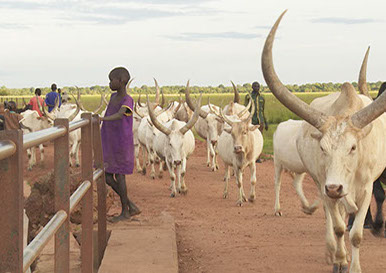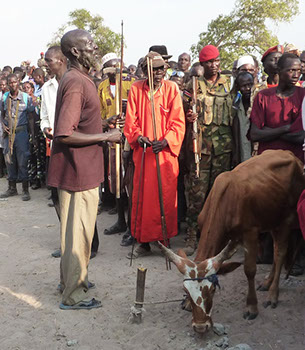Annual Update 2018 VNG International

‘We sat with the three governors from Gogrial, Wau and Tonj. And we signed an agreement. All the other communities are abiding by that agreement and we are implementing it. Now you can see that the communities of the three areas are freely moving. Without that cooperation they would not be in the position to move.’
Hon. Andrea Mayar Acho
Governor of Wau State

‘There are no disputes anymore, because people cooperate with each other, with the government, and there is mutual trust. The people came up with their demands and the government met the demands of the communities. That is why we are very proud.’
John Arop Apai
VNG International local liaison, one of the initiators of Cattle Migration Management
‘Cattle entered a farm and destroyed all the crops. I called together the committee, we went to the farm and talked to both sides. I explained the content of the Marial Bai Agreement that was signed in November 2016. The Agreement states that the cattle owner has to compensate the farmer and he did.’
Santino Mangot Akot
Chief Marial Bai County
Dealing with Conflict, Fragility
and Migration by strengthening
local government
Featured Project
South Sudan, Interlinking Peace Building, Decentralisation and Development
> After violent conflict in South Sudan flamed up in 2013, VNG International decided to focus its part in this project on supporting a peaceful solution for recurrent violent conflicts between pastoralists and agriculturalists in Gogrial, Tonj and Wau States in South Sudan. The affected local governments had invited VNG International to support previously initiated community-led dialogue, with technical expertise, a fresh perspective and new ideas.
Results include:
- The process led to the signing, in November 2016, of what is generally referred to as the Marial Bai Agreement, which protects diverse livelihoods, crops and cattle, and promotes peaceful relations between communities during the dry-season cattle migration. It regulates the arrival time and the locations of cattle camps away from fields and villages, and it sets a compensation price for damages to crops and animals to avoid retaliation by affected communities;
- A well-defined involvement of formal authorities at state level has been elaborated and is functioning. This has increased the legitimacy of state institutions, sanctioning the Agreement, protecting the physical and economic interests of the communities;
- During the whole preparatory process careful guidance was given, leaving responsibilities as much as possible with the communities and other parties involved. Trust between the rivalling communities has grown step-by-step as a basis for the Agreement;
- In the same way, careful guidance has helped to gradually build the political will at the level of state institutions. The buy-in of local and state governments, formalised in 2017 by the three State Councils of Ministers, ensured that structures and minimal resources were guaranteed for the monitoring and implementation of the Agreement;
- Currently, the Marial Bai Agreement is successfully implemented by the communes of 19 counties under the overall management of the Interstate Coordinating Committee on Cattle Migration;
- Since the signing of the Agreement, a substantial decrease in incidents has taken place, with substantially less physical and material damage;
- The few incidents that have taken place, have all been settled in line with the provisions under the Agreement;
- Gun ownership by cattle keepers was one of the most contentious issues in the process. The Agreement places the responsibility of arms control with the State Security Committees. Migrating cattle camps are not allowed to bring weapons into the state and this is now monitored. Farming communities report to feel much safer now.
- The whole process has got a lot of attention of the South Sudan Peace and Reconciliation Commission, policy makers like the Local Government Board of the Government of South Sudan, the media, etc. They see it as an example of how conflicts can be solved peacefully through dialogue;
- Leaders of Gogrial State have asked VNG International to provide the same support again to the Ajiep Peace and Reconciliation Conference, dealing with a different conflict in Gogrial State.